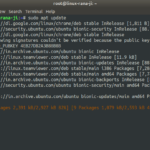Distributed computing is becoming increasingly popular for businesses, but why? What are the benefits of this technology and how can it improve the way you do business? In this blog post, we’ll explore the advantages of distributed computing and how it can help your business become more efficient, reliable, and secure.
Understanding Distributed Computing

Distributed computing is a concept that has rapidly gained popularity in recent years. It refers to the use of multiple devices, such as computers and smartphones, to process commands and access data through a common network connection. The scope of distributed computing is vast, ranging from simple applications like cloud storage and file sharing to complex systems used in scientific research and financial analysis. In essence, it allows multiple devices to work together seamlessly, leveraging their combined processing power and storage capacity to achieve greater efficiency and scalability. Despite this complexity, distributed computing is becoming increasingly accessible, with many cloud-based services and platforms available to businesses and individuals alike. In sum, distributed computing represents a significant step forward in the evolution of modern computing, offering new possibilities for collaboration, innovation, and productivity.
Similarly, the scope of distributed computing is vast and covers various industries today, including finance, healthcare, retail, and more. With the advancement of technology, distributed computing has become a vital tool in managing complex data sets and performing intricate calculations. The ability to connect multiple systems across geographically dispersed locations not only optimizes communication speed but also enables real-time data processing, which is crucial for businesses to stay competitive in the modern-day market. In conclusion, distributed computing offers a world of possibilities that can simplify processes, increase efficiency, and improve decision-making capabilities for organizations of all sizes.
Advantages of Distributed Computing for Businesses

Distributed computing is a technological advancement that connects multiple computers and devices using a common network but are physically separated. This innovation offers businesses numerous advantages, one of which is the ability to access data and applications from multiple locations. By doing so, it can drastically reduce the need for expensive physical infrastructure, which can be a significant cost saver for businesses. The distributed computing model makes it possible for multiple computers to work together and combine their computational power, creating a more efficient and productive work environment. Additionally, this technology offers businesses more flexibility, scalability, and reliability by ensuring that their systems are always available and can continue functioning even if one computer fails. This allows businesses to seamlessly transition between physical locations without disrupting their day-to-day operations. Distributed computing has revolutionized the way businesses conduct their operations, providing them with more agility and robustness to stay competitive in today’s ever-evolving technological landscape.
However, with the adoption of distributed computing, businesses are no longer limited by physical barriers. They are able to connect and collaborate with devices in different locations, having access to a vast array of computing power. This has brought about benefits such as faster processing times, increased reliability, cost-effectiveness, and improved efficiency. Distributed computing allows businesses to expand their capabilities and achieve their goals without being constrained by physical distance. It has provided a way for companies to manage their resources better, adapt to changing market conditions, and scale operations quickly, all while being physically separated. As technology continues to evolve and advance, distributed computing will undoubtedly play an increasingly vital role in the success of businesses around the world.
Strategies for Making the Most of Distributed Computing
Distributed computing is an efficient way for multiple computers and devices to connect through a common network, even when physically separated. However, this method requires security measures to ensure that data remains confidential and secure. One of the key strategies is to ensure that each computer and device is properly secured. By doing so, a company can leverage the advantages of distributed computing without sacrificing its security. Therefore, it is crucial to implement proper security protocols to safeguard against the risk of cyber-attacks and data breaches. As distributed computing continues to evolve and become more prevalent, it is necessary to prioritize security in order to maximize its potential benefits.
Thereafter, it is imperative for companies to prioritize the establishment of protocols and policies that will govern how data is exchanged between computers and devices on the network. Doing so is key in optimizing distributed computing and avoiding any potential conflicts or misunderstandings. As a result, businesses can make the most out of distributed computing technologies and use them effectively to their advantage. By incorporating these strategies into their operations, companies can embrace the benefits of distributed computing and stay ahead of the competition. Ultimately, the successful implementation of distributed computing technologies relies on efficient communication and well-defined protocols, allowing businesses to achieve maximum efficiency and productivity.
Challenges of Distributed Computing for Businesses

Distributed computing allows businesses to harness the power of multiple computers and devices that are physically separated yet connected through a common network. While this presents enormous benefits, it also poses some significant challenges, one of which is ensuring secure access to data and applications shared across the network. Businesses must take proactive steps to ensure that their networks are properly secured against malicious actors who could compromise sensitive data and applications. This involves implementing robust security measures such as firewalls, encryptions, and intrusion detection systems to safeguard the network and maintain data privacy. Ensuring secure access to distributed computing networks remains a crucial task for organizations that want to stay competitive and protect their assets from external threats.
All in all, distributed computing has revolutionized the way businesses function by providing them with a powerful platform to process large amounts of data quickly and efficiently. However, this technology is not without its challenges, especially when it comes to managing IT resources efficiently. The increase in network traffic caused by multiple computers and devices connected to a common network can cause bottlenecks and system outages if not managed properly. To overcome these challenges, businesses must have a comprehensive strategy that includes effective resource allocation, regular maintenance, and thorough monitoring of the network. By doing so, they can leverage the power of distributed computing to achieve their objectives without compromising on the performance and reliability of their systems.
Conclusion
In conclusion, distributed computing is a great way to improve the performance and reliability of your business systems. It provides scalable, secure and cost-effective solutions that can help you keep up with the ever-changing needs of your business. By making use of distributed computing, you can ensure your business is taking advantage of the latest technologies and helping you stay ahead of the competition.






